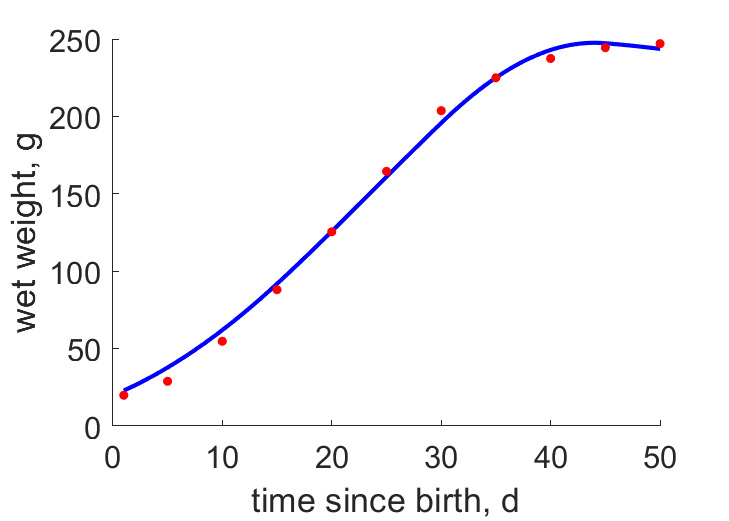Predictions & Data for this entry
| Model: std | climate: Aw, BSk, Cfb, Dfb | migrate: Ms | phylum: |
| COMPLETE = 2.5 | ecozone: THp, TPa, TPi | food: biCi, biHl | class: |
| MRE = 0.013 | habitat: 0iFm | gender: Dg | order: |
| SMSE = 0.000 | embryo: Tnffm | reprod: O | family: |
Zero-variate data
| Data | Observed | Predicted | (RE) | Unit | Description | Reference |
|---|---|---|---|---|---|---|
| ab | 21.5 | 22.57 | (0.04956) | d | age at birth | SnowPerr1998 |
| tx | 45 | 44.98 | (0.0005332) | d | time since birth at fledging | SnowPerr1998 |
| tp | 135 | 134.4 | (0.004711) | d | time since birth at puberty | guess |
| tR | 365 | 365 | ( 0) | d | time since birth at 1st brood | CramSimm1980 |
| am | 6789 | 6789 | (6.183e-05) | d | life span | SnowPerr1998 |
| Li | 33.5 | 33.48 | (0.0004995) | cm | ultimate total length | SnowPerr1998 |
| Wwb | 13.9 | 13.58 | (0.023) | g | wet weight at birth | PappKara2007 |
| Wwi | 320 | 323.5 | (0.01083) | g | ultimate wet weight | SnowPerr1998 |
| Ri | 0.03836 | 0.03833 | (0.0007287) | #/d | maximum reprod rate | SnowPerr1998 |
Uni- and bivariate data
| Data | Figure | Independent variable | Dependent variable | (RE) | Reference |
|---|---|---|---|---|---|
| tW |  | time since birth | wet weight | (0.02844) | Wood1974 |
Pseudo-data at Tref = 20°C
| Data | Generalised animal | Gallinula chloropus | Unit | Description |
|---|---|---|---|---|
| v | 0.02 | 0.03144 | cm/d | energy conductance |
| p_M | 18 | 505.9 | J/d.cm^3 | vol-spec som maint |
| k_J | 0.002 | 0.02078 | 1/d | maturity maint rate coefficient |
| k | 0.3 | 0.3007 | - | maintenance ratio |
| kap | 0.8 | 0.6896 | - | allocation fraction to soma |
| kap_G | 0.8 | 0.8003 | - | growth efficiency |
| kap_R | 0.95 | 0.95 | - | reproduction efficiency |
Discussion
- Males are assumed not to differ from females
- mod_3: v is reduced; food availability taken variable in tW data
- mod_4: Pseudo-data point k is used, rather than k_J; Data set tp and parameter t_R are added, the latter replacing clutch interval t_N. Postnatal T is based on PrinPres1991, see get_T_Aves. See further the revision page, theme puberty
Bibliography